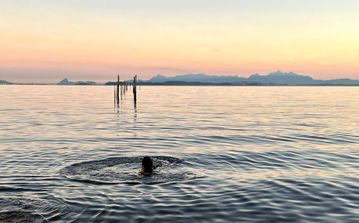Emergent Ecologies


Fishing for Plastics



Lives Impacted by Oil
The photograph above captures an emblematic contrast present in Guanabara Bay: in the foreground, a simple and small artisanal fishing boat evokes the tradition and resilience of a way of life. In the background, dominating the landscape, is the ship Abreu e Lima, currently being refurbished to become an oil tanker. The image sums up the power dynamic between industry and local communities.
The discrepancy in scale and purpose between the two vessels is evident. The caíco, operated by fishermen who depend directly on the quality of the water, fish, and plants in the bay for their livelihood, represents the traditional ways of living in harmony with the local ecology. The ship, on the other hand, symbolizes growing industrialization and the imposition of an economy focused on natural resource extraction, often to the detriment of the local environment and the well-being of the communities that depend on it.
The renovation of the Abreu e Lima into a tanker is not only a physical transformation, but also a representation of the movement towards an economic model that places industrial growth and resource exploitation above sustainability and local ecology. The proximity of the two vessels in the photograph highlights the connection and conflict between these realities, providing a visual metaphor for the tension that exists between industrial progress and environmental conservation in the Guanabara Bay.

Photo: Frederico de Assis. Date: 27/07/2023. Location: Anchorage areas
The narrative dispute between artisanal fishermen and certain companies over the environmental condition of the Guanabara Bay is not just a conflict of economic and subsistence interests, but also a symbolic clash that defines how society in general perceives and values this ecosystem.
The starting point for this research was to understand the basis of the conflicting narratives: on the one hand, that of the companies, which may have an interest in continuing industrial activities or developing infrastructures that impact the environment. For them, the notion that the Guanabara Bay is a "Sacrifice Zone" can serve to justify interventions that favor economic growth, even at the cost of environmental degradation. This narrative is often aligned with a discourse of inevitable progress, in which certain environmental losses are seen as a necessary price to be paid for development.

On the other hand, artisanal fishermen see the bay not only as their place of work, but also as a source of cultural identity that is key to the maintenance of their way of life, and are fighting to protect the vitality of the ecosystem. For them, Guanabara Bay is alive, full of species that sustain their communities and which are a testament to the resilience of the environment. This struggle transcends the economic sphere and touches on the community's right to exist and prosper, its autonomy, and its way of life.
In this way, the approach of this research sought to understand the practices, narratives and local knowledge that are often overshadowed by discourses of development and industrialization. In order to walk side by side with artisanal fishermen, we chose to document and analyze the environmental challenges they face, while simultaneously following their lead in paying attention to the manifestations of life that persist and enrich this ecosystem, as well as the solutions presented by fishing communities to mitigate conflicts.



































